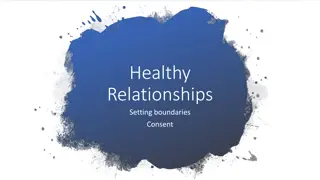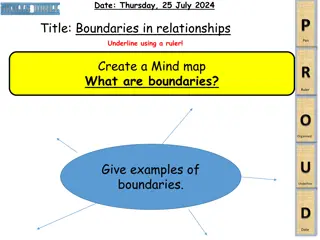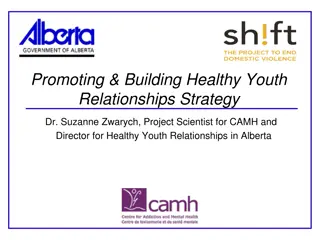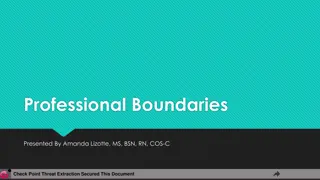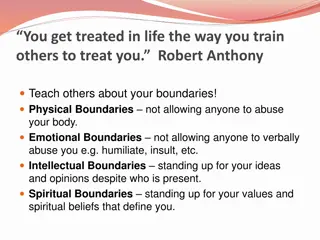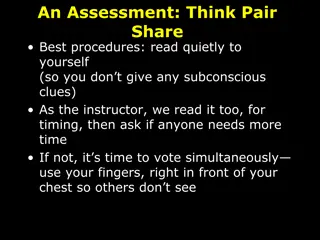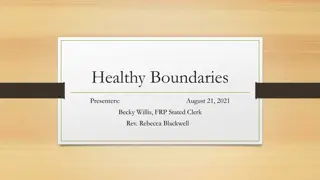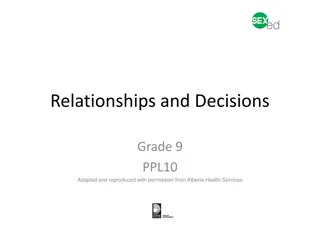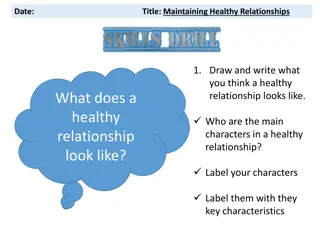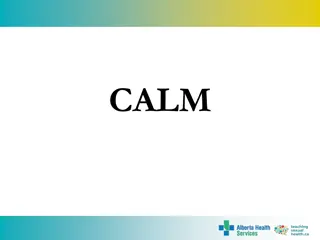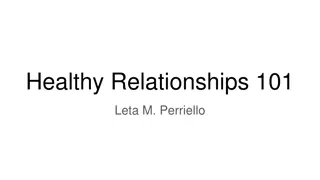Understanding Boundaries in Healthy Relationships
Boundaries play a crucial role in maintaining healthy relationships. They define limits in various aspects like physical contact, personal information sharing, and environmental parameters. Knowing and implementing personal boundaries is key to self-love and energy protection. This post delves into different types of boundaries and how they apply in everyday scenarios to help you navigate relationships effectively.
Download Presentation

Please find below an Image/Link to download the presentation.
The content on the website is provided AS IS for your information and personal use only. It may not be sold, licensed, or shared on other websites without obtaining consent from the author. Download presentation by click this link. If you encounter any issues during the download, it is possible that the publisher has removed the file from their server.
E N D
Presentation Transcript
Date: Title: Healthy Relationships: Boundaries 1. Define what you understand about the term boundary. What is a boundary? CHL: Why do you think boundaries are important? How might boundaries vary? Why do you think it is important to know what your personal boundaries are? To practice self-love and protect your energy, you need to start implementing boundaries with the people you surround yourself with. Florence Given
Different boundaries: Define what you think is meant by each of the following types of boundary. Environmental Process Physical boundaries Personal boundaries
Answers! Environmental - Boundaries include a country s or a state s borders. They can also refer to restricted areas of a building. E.g. at school you can t use the staff toilets Process Boundaries refer to the parameters around how things happen. These include starting and ending the class on time, getting to a doctor s appointment on time, doing homework before watching a movie etc. Physical boundaries Includes not only whether you have any kind of physical contact with another person, bit how much. E.g. you might be okay shaking hands with a particular person, but you don t want to hug them. You may love to hug, but you end up hugging someone who hates to be hugged: these boundaries are important. Personal boundaries Refers to how much you share of your personal life. What do you keep private? What do you tell other people?
Different boundaries: Which boundaries do you think that the examples you have been given relate to? Make sure you can justify your choices! Starting lessons on time Pelican crossing If you allow someone to hug you A one way system Telling someone about a personal problem Who you would kiss Who you d talk to about a recent break up The warning system A document that shows the land someone owns How close someone can sit next to you The edge of a car parking space If you d allow someone to braid your hair Traffic light systems Restricted areas of a building Someone you d trust with a secret Telling someone about something that embarrassed you
Answers! Environmental Process Physical boundaries Personal boundaries Starting lessons on time Pelican crossing If you allow someone to hug you A one way system Telling someone about a personal problem Who you would kiss Who you d talk to about a recent break up The warning system A document that shows the land someone owns How close someone can sit next to you The edge of a car parking space If you d allow someone to braid your hair Traffic light systems Restricted areas of a building Someone you d trust with a secret Telling someone about something that embarrassed you
What are your personal boundaries? We are going to look at our shared boundaries together Answer the work sheet with what you would do don t put your name on the sheet, do be honest We will discuss ideas in a way that keep our answers confidential. E.g. some people
We are going to be focussing on our physical and personal boundaries what we re comfortable with, and what to do if we re with someone whose boundaries are different from ours. If I m in a relationship with someone, I want to hold hands and walk with our arms around each other to show people we re together. Explain your ideas: If one partner is happy with this, but the other isn t, what should each partner do? Should the partner who is comfortable keep making the other hold hands? Why or why not? Who is responsible for sharing these boundaries? Explain why.
We are going to be focussing on our physical and personal boundaries what we re comfortable with, and what to do if we re with someone whose boundaries are different from ours. When I m watching TV with my friends or siblings, I want my own space I don t want us to lean on each other or sit too close. Explain your ideas: Does this apply if there isn t much room? What other options could the person take? What makes this an important boundary for people to choose?
We are going to be focussing on our physical and personal boundaries what we re comfortable with, and what to do if we re with someone whose boundaries are different from ours. When I see someone I know, I ll physically greet them in some way a hug, handshake, punch on the arm etc. Explain your ideas: How can you establish this boundary with people you re just meeting? What do you think you could say to show you re uncomfortable? What other options might you take? If you reluctantly hand shake, is that okay?
We are going to be focussing on our physical and personal boundaries what we re comfortable with, and what to do if we re with someone whose boundaries are different from ours. I don t like it when someone hugs me from behind. Explain your ideas: How could you make this boundary clear with other people? How would others know this boundary?
We are going to be focussing on our physical and personal boundaries what we re comfortable with, and what to do if we re with someone whose boundaries are different from ours. I think if one of your friends really want to try something new, the other friend should at least give it a go if they re the only one there. Explain your ideas: Is it okay to negotiate a boundary? If it is, how can the friends negotiate? What do you think that they would need to do to make sure that everyone feels safe?
We are going to be focussing on our physical and personal boundaries what we re comfortable with, and what to do if we re with someone whose boundaries are different from ours. I don t mind it when someone physically moves my body when they re trying to get past me. Explain your ideas: How can you share your feelings with someone that you don t know? Are there any circumstances that this might be difficult to operate in? Are there any risks about sharing this boundary with other people? CHL: Are there any circumstances that this boundary might be broken by people in authority? Can you suggest any examples?
We are going to be focussing on our physical and personal boundaries what we re comfortable with, and what to do if we re with someone whose boundaries are different from ours. I am happy to hug and kiss distant relatives. Explain your ideas: Does the relative need to ask every time? How could you avoid this without offending others? Who could you talk to in order to establish your boundaries? How might this change between children and adults?
We are going to be focussing on our physical and personal boundaries what we re comfortable with, and what to do if we re with someone whose boundaries are different from ours. I could tell someone if they were not respecting my personal boundaries. Explain your ideas: Why might people be worried about setting their boundaries? Can personal boundaries change with someone? How and why might they change? What would you do if someone wasn t respecting your boundaries?
What are your rights and responsibilities when it comes to your relationships with others? Your rights: Your responsibilities: Ensure that you tell people your boundary Once you have been told a boundary, you need to respect the boundary Ask for permission when you think about people s personal and physical boundaries check it s okay to hug etc. Your boundaries should be respected by others You should not be punished (e.g. by using the silent treatment or ignoring you) because of your boundary you shouldn t be made to feel bad because you have said no , or made to do things you re uncomfortable with. Can you add any further ideas?
What you can do: 1. Be clear Other people can t read your mind. If a boundary is important to you, speak up. 2. Don t push People can have all sorts of reasons for maintaining a boundary in a relationship. It could be as simple as they don t like doing something. 3. Always ask for consent An absolute yes or an absolute no is easier to understand than a sometimes . If someone is just okay with doing something sometimes , the only way to make sure with someone is to ask.



